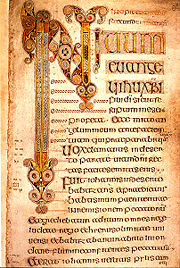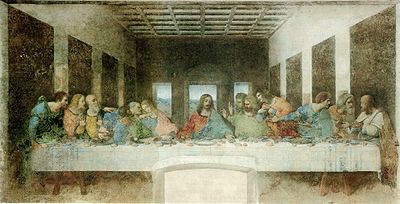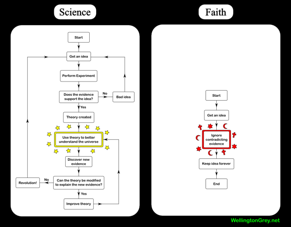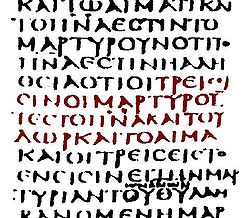Category: "faith/skepticism"
Books For Sale
During my time as a Christian and as a pastor I collected lots of books. It's been 2.5 years since I stopped believing in the Christian faith, so most of those books are irrelevant to me. Last night Sara and I went through our bookshelves and pulled out the books that we no longer want. I'm offering them for sale either as a group (my preference) or individually. I'd like to sell them locally, but I can ship them, too. This would make a nice addition to a church's or pastor's library.
I did keep a few books, including the most important texts to a few religions: a Bible, a Koran, a Book of Mormon and Dianetics (Scientology). I also kept a few apologetics books, a couple of secular academic books about Christianity, a book teaching the Biblical doctrine of geocentricism and several books from my time in the Church of Christ.
Below you'll find a partial list of the books I have for sale. There are also about a dozen Bibles of various types. If you want to stop by and look through the boxes, contact me. You might even leave with a few free books. For prices, I'm going to consult the used items on Amazon.com. But I'll consider any offers.
Bishop Spong on Christmas
I love Christmas. I'm not sharing these links to attack the holiday, but to open a discussion about which ideas and stories of Christmas are true and which are myth. For me, Christmas is a time of love, family and sharing. It's a bright cheery island in the long winter, something to look forward to. The stories told about Christmas are instructive and heartwarming, but as we mature we must sort out fact from fiction. In this series of articles, Bishop John Shelby Spong addresses the historicity of the nativity stories and what we can learn from them, even if they aren't literally true.
I look forward to a spirited and friendly discussion.
Why Evolution Is True
Here is Jerry Coyne giving a talk based on his book, Why Evolution Is True:
[youtube]w1m4mATYoig[/youtube]
I thought it was a good presentation of the evidence for evolution, though he veers a little off topic toward the end. He points out that acceptance of evolution is lower in America than almost any other developed nation and he explores why that might be and how it could be changed. It is a little strange that many people are unconvinced by the evidence that evolution happened, yet they are convinced that a person came back from the dead based on hearsay accounts from decades after the fact. Oops, now I'm getting off topic.
Anyway, check out the video and keep in mind that it is possible to accept evolution without giving up your faith.
Infinite punishment
A group was handing out these fake money tracts at the parade on Saturday in Billings, MO:
The highlighted line reads:
God's perfect justice demands an infinite punishment in hell for breaking just one commandment.
What an impossibly unfair system! This bit of bad news is crucial groundwork for any evangelist trying to win a soul, but why should the target accept such an idea? I now see this as the church inventing a disease so they can sell you the cure.
You do not deserve to be tortured.
You do not need to be saved.
7 Advantages of Nonbelief
I didn't give up belief in God because I thought it would make me happy. In fact, I began my examination of the claims made by Christianity with some fear that life without faith would be bleak and rudderless. After two years of nonbelief, I've discovered that not only do I not miss my faith, I am happier and better able to enjoy life than in my Christian years. Here are a few specific examples.
#1 Stuff happens
Belief in an all-powerful and loving God is difficult to reconcile with the tragedies and suffering in the world. I used to struggle with the question of why. Why would God allow these things to happen? How could he stand idly by while a child is tortured, while cancer destroys a body, while an old woman drowns in the floodwaters that inundate her house? With prayers on their lips, people die waiting for help that never comes, waiting for some response from a God who is silent. I don't doubt that some Christians are able to come to terms with this difficulty, but I have taken comfort in the knowledge that there is no all-powerful being refusing to help in these situations. Things happen. There's no one in the driver's seat directing everything and looking out for us. We have to look out for each other.
#2 No hell below us
I no longer live in fear of being tortured forever. I don't have to convince myself that a loving God is justified in condemning people to hell. Hell doesn't exist. Now it seems obvious to me that it was only an idea dreamt up to keep people in line and to silence criticism. I used to buy into the idea of hell and the justifications for it, but I am happier and healthier now that I know it's not real.
#3 This world is my home
As a Christian, I viewed my life on Earth as the prologue to eternity. The afterlife was the main event. Now I see this life as my one chance and I place more value on the time I have left. The scarcity of a commodity increases its value. I realize that belief in heaven can help people to cope with situations that they cannot change. But there is a danger to this. Slave owners used to encourage religion among their slaves because it shifted their hope from this life to the next. This life is all I have and I'm going to do my best to live well every day.
#4 The Bible
I now see the Bible for what it is: a human book. This shift in perspective has helped me to make sense of the book. I no longer feel the need to shoehorn facts into a framework that describes the Bible as communication from a perfect God. Most of the time this translates to ignoring the Bible. It has little to no bearing on my daily life. I'm also able to see the cruel and absurd passages of the Bible as the products of cruel and absurd humans. It's a great relief to be free from the responsibility of defending this book. The Bible does contain some wisdom and now I feel able to separate the wheat from the chaff and to recognize that the source of wisdom in the Bible is a human one. The same goes for other religious texts. They may have some wisdom, but they were created by humans.
#5 Privacy in my thoughts
I used to believe that God was listening to my thoughts at all times. That can be a comforting idea, but it can also be a little disturbing. I'm happy to know that no one is spying on my mind. I'm not a god's property. I no longer call myself a sheep or a servant. That type of language encourages submission to masters (God and religious leaders).
#6 Free time on Sundays
While I miss playing in the band and seeing my friends on Sunday mornings, I have enjoyed the free time. I can now sleep in on Sundays. I was often bored at church, hearing the same basic ideas repeated over and over: Don't sin. Read the Bible. Pray. Believe. God is great. It's not hard to find a more interesting and useful way to spend my Sundays.
#7 Not tithing
As a Christian I faithfully gave a percentage of my income to my local church. That money was used for a variety of things including maintaining a building, paying church staff, helping the less fortunate and sending missionaries abroad for the purposes of aid and proselytizing. It's been nice to be free of that obligation and to know that I'm not supporting a church that practices discrimination. I'm finding other avenues for helping people (like Kiva).
My fellow nonbelievers, what other advantages are there to living without faith?
Alternatives to Faith
I asked my readers to offer their definitions of the word faith. I'd like to stir together their thoughts along with the definitions provided in the dictionary and the Bible, adding a dash of my own opinion and boiling it down into a concise, simple working definition for faith.
Here are some of the things my readers said:
- Faith is to believe in something when everything else around is saying there is no possible way.
- Faith is living in a reality that has not yet come and by proof that isn't testable.
- Believing in something that can't be proven to be true.
Dictionary.com has: "Belief that is not based on proof."
The Bible, in Hebrews 11:1, says: "Now faith is being sure of what we hope for and certain of what we do not see."
Here's my summary of all of these definitions:
Certainty without evidence.
There are other definitions for the word faith, but I am responding to this specific one. This is the type of faith people refer to when I ask them questions and point out the lack of evidence for their religion and they tell me that I just need to have faith.
Faith is usually invoked only for questions to which the evidence does not give a clear answer. It doesn't sound quite right to say, "I have faith that water boils at 100°C." We can settle that question with a simple experiment. But faith is likely to come up for harder questions like
- How did the universe begin?
- How did life begin?
- What is the purpose of life?
- What is the source of our shared moral values?
- What happens to our consciousness after we die?
Faith allows people to have certainty in the answers they give to these questions. It feels nice to be certain, but if that certainty is misplaced, it can be harmful. Here are some alternatives to faith: The facts, uncertainty and inquiry.

1. The facts
In some cases, faith is applied to a question that has already been answered. In the years before the germ theory of disease and the discovery of bacteria, many explanations were put forward for why people got sick. One idea was that evil spirits can inhabit a body and make a person sick. This idea is even present in the New Testament. Now we know that diseases are caused by bacteria, viruses and malfunctions within the body. Some people still believe that some health problems are caused by evil spirits, but most of us recognize that faith is not a good approach to the question of disease. Rather than having certainty without evidence we can look at the facts and put our confidence in the explanations that are backed by evidence. We still don't know everything about disease, but we know enough to see that facts, when available, are better than faith.
We should all heed Augustine's warning and be careful not to put faith in an idea that is plainly contradicted by the facts.

2. Uncertainty
For some questions, the jury is still out. When we look at the facts, we find that we can't give a confident answer backed up by evidence. Faith allows one to have confidence in an answer that is not backed up by evidence. Is this type of faith-based answer better than no answer at all? I contend that it is not. I think it is better to humbly acknowledge our uncertainty than to put our confidence in speculation. When we don't know, let's just say "I don't know." To put it another way, confidence in an idea should be proportional to the evidence.
Take the origin of the universe as an example. Despite the best efforts of science, we still don't know exactly how the universe came into being. What existed before the Big Bang? What triggered the event? Scientists don't know and may never know. Faith allows people to confidently answer that a god created the universe, but how useful is that? If anything, it brings up more questions than it answers (where did this god come from?). I think it's better to say "I don't know" than to have certainty in an explanation with no evidence. We might find this certainty comforting, but it's a false comfort. And if it prevents us from looking for real answers, then it may cause more harm than good.
3. Inquiry
Once we acknowledge our uncertainty, it's possible to begin an inquiry. Faith, on the other hand, hampers inquiry. If you have certainty in an answer, you won't bother looking for a better answer. This is why creationism (even when rebranded as "intelligent design") is so maddening to those of us who support science. Once someone buys into the idea that a god created each species individually, they won't be interested in or open to the scientific inquiry that is uncovering real answers.
Science is a type of systematic inquiry. The first step is to make a guess (hypothesis) about how something works. The next step is to carefully perform experiments and gather data to see if the facts confirm or contradict the hypothesis. A well-designed scientific inquiry can be repeated by other scientists and should give them the same results. Only after all of these steps, can the scientists draw conclusions with any confidence. And even then those conclusions are subject to revision if someone uncovers contradicting evidence. It won't do to make a hypothesis, convince yourself that it is 100% certain and then ignore all contradicting evidence. That's bad science. But that is exactly how faith works.
Faith also begins with a guess. But then it skips all the other steps and jumps straight to certainty. The main support for faith comes not from facts, but from stories, traditions, rewards and punishments. Someone comes up with the idea that a sound of thunder is caused by Thor slamming his hammer against the mountains. He tells stories about why Thor is doing this and those are incorporated into ceremonies to appease the god. Those who believe in the stories and follow the traditions are promised that the deity will watch out for them and reward them after they die. Doubters are threatened with temporal and eternal punishment. It's impossible to discover the real answer without first giving up our certainty in the imaginary answer. Faith has to be replaced with uncertainty and then inquiry. If the faith answer is really true, then a rigorous inquiry will confirm that. We have nothing to lose by giving up faith.
Faith, as I defined it above, can and should be replaced with facts, uncertainty and inquiry. We will lose a little comforting certainty, but we will gain a universe full of amazing, surprising and useful facts. There will still be mysteries to solve and goals to strive for. We will find that reality is more awe-inspiring than anything imagined by faith.
Faith and wishful thinking
I'm still working on an article about faith, but I wanted to bounce another idea off of my readers. What is the relationship between faith and wishful thinking? The Bible says that faith is "the evidence of things hoped for." Certainly many of the central tenets of Christian faith are things that people wish were true:
Your consciousness will survive the death of your body.
There's someone in control looking out for you.
The injustices of the world will be made right.
You don't have to take the blame for the bad things you've done.
Of all the religions in the world, yours is the right one.
There are several aspects of Christianity that people may not wish to be true (hell, for example), but I think they are outweighed by the items above. If faith does have an element of wishful thinking, that doesn't mean it's not true. But it does supply a motive for people to buy into unproven ideas.
What is faith?
I'd like to do some writing, thinking and discussing about the subject of faith. I have some ideas about it, but I'd like to hear from you, so here are some questions to get things started:
1. What is faith? How do you define the word?
2. Is it a good thing or a bad thing? In all situations or just some?
3. Does your answer to #2 hold true for people with faiths other than your own?
4. How do you decide what to have faith in?
6 Passages That Weren't in the Original New Testament
The printing press was invented in 1439, so for the first 1400 years of Christianity all of the books were copied by hand. For the first 300 years, that work was done by literate church leaders rather than by a class of professional scribes and monks as was the case later on. The same Christians that were preserving and copying the texts that became the New Testament were also embroiled in several theological debates. We now know, based on comparisons of the surviving manuscripts from the history of the Church, that those early copyists made changes to the text. Most of those changes were minor mistakes like spelling, word order, skipping a line or just a simple misreading. But in some cases, entire verses or passages were inserted by the scribes to bring the text in line with their theological views and to bolster their position in the debates of the day.
1. Mark 16:9-20

What it says
Our most reliable early manuscripts of the Gospel of Mark end with Mark 16:8, which says that some women discovered the empty tomb of Jesus, but never mentioned it to anyone. This may have been all there was to the story when the Gospel of Mark was written, but when church leaders were copying this book more than a century after it was written, this abrupt ending must not have seemed right to them. So, they added some post-resurrection appearance stories and a commission from Jesus calling people to be baptized, speak in tongues, heal people and handle deadly snakes without being harmed.
Why they changed it
By the time this passage was added, the other Gospels with their post-resurrection appearances and ascension accounts were well-known throughout the early church. The abrupt and unimpressive ending of Mark may have been a source of embarrassment for the church. It served as a record of the changes that had already been made to the stories about Jesus. The addition of this ending brought Mark in line with the other Gospels and smoothed over this inconsistency. (I also discussed the ending of Mark here.)
2. John 7:53-8:11

What it says
This passage contains the story of the woman caught in adultery. It is the source of the iconic phrase "Let he who is without sin cast the first stone." Although it is a charming story about grace and forgiveness, the textual evidence suggests that this passage was not in the original version of the Gospel of John.
Why they added it
There's no obvious reason for the insertion of this story. It may have simply been a part of the oral tradition about Jesus that was added to the margin of a manuscript by a scribe and inserted into the text by a later scribe. Interestingly, we have manuscripts that insert this story at different points in the Gospel of John. One scribe even stuck this story into the book of Luke. Most modern translations include this passage but label it as a later addition. If you see the Bible as a book written by a perfect God and transmitted by fallible humans, then you must discard this passage as a human invention, which is a shame because it teaches a nice lesson.
3. John 21
What it says
John 20 ends with what looks like a closing statement:
Jesus did many other miraculous signs in the presence of his disciples, which are not recorded in this book. But these are written that you may believe that Jesus is the Christ, the Son of God, and that by believing you may have life in his name.
 John 21 seems like it was tacked on to an already finished book, but there are no surviving manuscripts that omit John 21. So, the only evidence that this passage was added by a scribe is the internal evidence of the text itself. If it is an addition, that would help make sense of John 21:24 which speaks of the author of the book in the third person.
John 21 seems like it was tacked on to an already finished book, but there are no surviving manuscripts that omit John 21. So, the only evidence that this passage was added by a scribe is the internal evidence of the text itself. If it is an addition, that would help make sense of John 21:24 which speaks of the author of the book in the third person.
Why they added it
This chapter includes the reinstatement of Peter, who had denied Jesus a few chapters earlier. This addition resolves that story line. Perhaps some early scribe listed an example of those "many other miraculous signs" after the end of the book (borrowing a story from Luke 5:1-11) and the next scribe copied that section as if it were part of the text. But if that happened, it was already done before our oldest manuscripts of the Gospel of John.
4. Luke 22:17-21
What it says
Here is the passage as it appears in the NIV, with the added passage in bold:
After taking the cup, he gave thanks and said, "Take this and divide it among you. For I tell you I will not drink again of the fruit of the vine until the kingdom of God comes." And he took bread, gave thanks and broke it, and gave it to them, saying, "This is my body given for you; do this in remembrance of me." In the same way, after the supper he took the cup, saying, "This cup is the new covenant in my blood, which is poured out for you. But the hand of him who is going to betray me is with mine on the table.

Why they added it
One of the theological debates that raged in the early church was about the meaning of the death of Jesus. Each Gospel has its own perspective on the significance of that central event, and each of those views had its defenders in the early church. Outside of this passage, the Gospel of Luke describes the death of Jesus as a miscarriage of justice and an occasion for repentance, but not as a sacrifice for sins. The addition of these lines to the text serves to bring Luke into agreement with what became the Orthodox view of the death of Jesus. The language that was employed here is very similar to what's found in 1 Corinthians 11:23-26.
5. Luke 22:43-44

What it says
An angel from heaven appeared to him and strengthened him. And being in anguish, he prayed more earnestly, and his sweat was like drops of blood falling to the ground.
Why they added it
In the Gospel of Luke, Jesus is always calm and collected, never letting his emotions get the best of him. Although several of his stories were copied (almost) word for word from Mark, the author of Luke always left out the parts that showed Jesus getting angry or upset. These two verses interrupt the flow of the passage, they don't fit in with Luke's usual portrayal of Jesus and they are not present in our earliest copies of the text. But why would this be added?
One of the theological controversies in the first few centuries of the church surrounded the question of who Jesus was. Was he a man? Was he God? Was he both? All three of these views were present in the early church. The latter ultimately won out and the other views were declared to be heresy. Luke was the gospel of choice for those who said that Jesus was a divine being who only appeared to be human. Some scribe inserted this passage so that Luke, like the other Gospels, attributed human emotions to Jesus.
6. 1 John 5:7-8
What it says
For there are three that bear record in heaven, the Father, the Word, and the Holy Ghost: and these three are one.
And there are three that bear witness in earth, the Spirit, and the water, and the blood: and these three agree in one. (KJV)
Why they changed it
The first line of this passage is not present in any manuscripts produced before the 16th century. All Bible scholars now recognize that this passage was inserted to improve the case for the doctrine of the Trinity, which is not clearly stated in the Bible outside of this added passage. Most translations of the Bible now omit the added passage or relegate it to a footnote. The King James version includes this passage because it was translated from late and unreliable Greek manuscripts.
Why it matters
Textual criticism is the field of study that attempts to discover what the original version of the Bible said. This is especially important for Christians who believe that the New Testament was inspired by God. If some passages were added or altered by human scribes, then those must be discovered and stripped away so we can get closer to the original text. But those changes also tell us something about the early church leaders. Many of them did not see the New Testament as an immutable document delivered from God, but as a text that could be changed to bring it in line with official church doctrine.
Perhaps you see these as a minor changes that don't affect the central message of the New Testament. I wouldn't consider the identity of Jesus, the doctrine of the Trinity and the meaning of the death of Jesus to be minor issues. But there is another, bigger problem with brushing these changes aside. They are probably only the tip of the iceberg. The oldest surviving copies of several books in the New Testament were made over 100 years after the original text was written. There may have been very significant changes to the text during that interval, but in the absence of manuscripts we don't know what they were (unless we rely on internal evidence as in the discussion of John 21 above). There's no reason to think that the copyists of the first 100 years were any more shy about making changes than the copyists of the next 300 years.
The changes that we know about show that even if the original books of the New Testament were inspired by a god, they were not miraculously preserved. That job fell to humans who introduced thousands of unintentional and intentional changes. So, even if you can come to terms with the changes I've listed above, you must also face the possibility that there are many more changes that we will never discover. And if the scribes were willing to make changes, then the Gospel authors probably were, too. In fact, we can see that Matthew and Luke took passages from Mark and made changes to them.
There are a lot of good ideas and stories in the New Testament, but I don't see how anyone can view it as a perfect book without disregarding loads of evidence.
(Much of the information for this post came from Misquoting Jesus by Bart Ehrman. It's a good introduction to textual criticism.)
Hell is Terrorism
Last fall my family and I were taking a walk around town when we saw this church sign:
Emma read the sign and we discussed it as we walked. Sara quickly noted a grammatical problem with the sign, but I will leave that aside for now and focus on the meaning and the goal of the sign. There may be other possible meanings, but I think that this sign was put up to send the message that people who "live like there is no God" will be tortured in hell for eternity unless it turns out that they are right and God does not exist. The sign belongs to a church in the Southern Baptist Convention, which broke away from the rest of the Baptist Church in 1845 so that SBC members could continue to own slaves. Someone in the church decided that the doctrine of hell should be used to threaten the public but hell should not be mentioned by name on a public sign.
First of all, if someone is convinced that God does not exist and the Bible is not true, then they almost certainly don't believe that hell exists. So, even if threats of torture were a good way to bring people into your church, the sign would still be ineffective because it threatens the reader with a nonexistent punishment.
 Hell is a bad way to make and keep converts because it relies on fear. There is a name for the tactic of using irrational fear to change a person's beliefs or actions: terrorism. When a religion uses hell (or any other threat) to scare a person into line, they're using the same tactics as Al Qaeda, Ted Kaczynski, Timothy McVeigh, Hezbollah and the Ku Klux Klan. Just to make myself clear:
Hell is a bad way to make and keep converts because it relies on fear. There is a name for the tactic of using irrational fear to change a person's beliefs or actions: terrorism. When a religion uses hell (or any other threat) to scare a person into line, they're using the same tactics as Al Qaeda, Ted Kaczynski, Timothy McVeigh, Hezbollah and the Ku Klux Klan. Just to make myself clear:
Hell is terrorism
Terrorism is an act of desperation. It is used when a group is unable to convince others based on the quality of their ideas. Remember that when you see or hear the threat of hell from a religious group. I'm happy to report that my 7-year-old daughter is already very skeptical of the doctrine of hell. I hope that she'll be immune to this kind of fear mongering if anyone ever tries to use it on her.
Those who believe in the Christian hell rarely lose any sleep worrying that they've chosen the wrong religion and they'll end up in Jahannam, Naraka, Tartarus, Xibalba or the hell of any other religion. Even (or maybe especially) those who preach hell know that it's easy and useful for a religion to invent stories about hell, but impossible to prove or disprove them.
There are plenty of Christians and churches who have left behind sadistic doctrine of hell and the tactic of terrorism in general. Of course, the easiest way to rid yourself of the fear of hell is to realize that the Bible is a collection of stories composed by humans to further a religion. It makes perfect sense that those ancient yarn-spinners would cook up the idea of hell. "Do what we say or the invisible man in the sky will make you go down to where it's hot and you're eaten by worms forever!" When their promises of pre-death punishment or blessing were shown to be empty, they shifted to promises about what happens after you die. We know better than to be moved by spooky stories like that today, right?


























































Recent comments